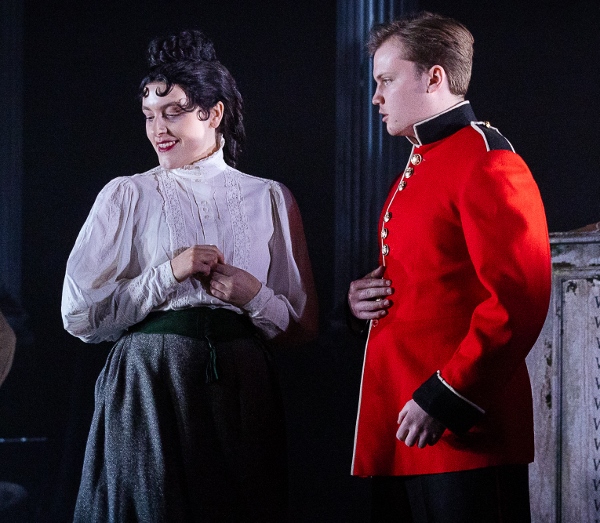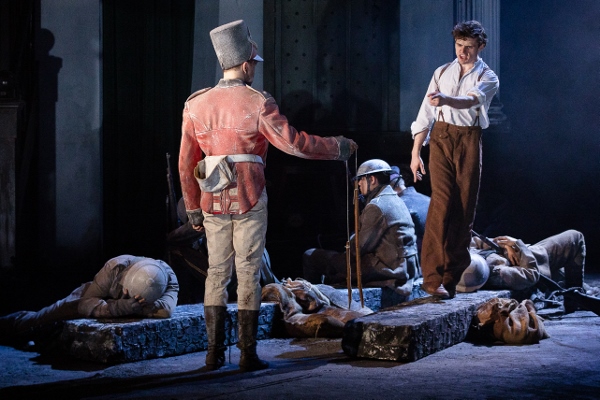It’s quite ironic that the Royal Northern College of Music should have invited, as director of this, Britten’s avowedly pacifist opera, Orpha Phelan – whose version of his Billy Budd for Opera North nearly 10 years ago contained one of the most thrilling battle scenes ever staged.
And, in her presentation of Owen Wingrave, war is not merely talked about, but seen. That’s very much to the good, as Myfanwy Piper’s libretto makes the adaptation of Henry James’ story very talkative: until very near the end, you might say all the action is in the dialogue.
Much can be made of the fact that the opera was written for television in 1971, commissioned by the BBC. Although it was some time since The Turn of the Screw (also an adaptation of James by Piper), there are aspects of it that seem modelled on that masterpiece (particularly the ratcheting up of tension towards the final tragic shock), and its dramaturgy is essentially intimate, not spectacular. (The RNCM has used the reduced orchestration by David Matthews, which makes sense, especially when young voices are still in development, as they frequently are in conservatoire opera.) Yet, it has survived as a staged work, and it’s arguable that Britten’s instincts were always essentially for the theatre, despite the attempt at a change of medium.
 An aspect of the piece that seems unavoidable is that its anti-war message had already been so effectively articulated in the War Requiem: a great many more jagged rhythms and distorted bugle calls don’t necessarily add to the argument.
An aspect of the piece that seems unavoidable is that its anti-war message had already been so effectively articulated in the War Requiem: a great many more jagged rhythms and distorted bugle calls don’t necessarily add to the argument.
Phelan’s production shows the ancestors of the military Wingrave family (who are ever-present in the family seat, Paramore, where most of the story is set) as real soldiers in uniforms of each of their times: probably beginning with Waterloo and including India, the Sudan, the Boer War, and so on. The opera itself is left in its own period, the late 19th century. During the overture we see them in mime of what soldiering is really about – a desperate attempt to stay alive in hellish circumstances – and they re-appear later in a composite set (by Madeleine Boyd) which shows both outside and inside the grandiose country house, plus the family tomb, with names – all Wingraves – carved on it like a school honours board. Imagined locations switch seamlessly from scene to scene, as the TV scenario no doubt demanded. There’s a kind of battery of circular lights aiming their broadside directly at the audience, as the opening sequence, set in a military academy, changes to the main location – are they the weapons of tradition and “honour” being ranged against young Owen, the pacifist soldier, as he takes his stand (“Charge for the guns, he said” – Tennyson)?
The explicit theme is the emptiness of “glory” (particularly “England’s glory”) as a justification for military endeavour and sacrifice. Owen tells us that it takes more courage to stand for peace than to fight a war, something that Britten himself wanted to believe, though it’s arguable that he had an easy time of it, having scuttled off to America at the start of the 1939-45 war – easier than Tippett, for instance, who went to prison for his stance. There may be hints of other considerations in Owen’s statement that he is “unwilling to prepare my mind and body for destruction” – Britten always put his own creative freedom first – and, against today’s sense of penal justice, Owen’s statement about those who make war, “Given a chance, I’d hang the lot” seems somewhat incongruous.
But those are issues with the Piper libretto more than the music. It’s not easy to sing – the “ballad” that introduces and concludes the second Act is a striking reminder that Britten could write in warmly melodious style if he wanted to: he didn’t for the remainder of this work. The young singers whom I saw (there are two casts, as usual with the RNCM’s opera productions) gave very good accounts of themselves, and in particular Sam Rose (pictured above, with Daisy Mitchell as Kate) as Owen’s academy friend, the dutiful soldier who finally takes his girl’s affections from him, Lechmere. His is a very fine and mature tenor voice which I trust we will hear a great deal more of. Alex Riddell caught the agonized gutsiness of Owen Wingrave extremely well, and Esther Shea was both convincing and vocally excellent as Mrs Coyle (the wife of his academy teacher and the only person in the story to show him real sympathy – it’s the role originally given to Heather Harper). Daisy Mitchell, whom I saw in the last RNCM opera (as Lazuli in L’Étoile) also impressed in the difficult role of the unsympathetic, unfaithful fiancée, Kate. Johannes Gerges (Spencer Coyle) grew in confidence in the nearest thing to a father figure shown in the story, and Samuel Horton managed to be the aged, bewhiskered patriarch Sir Philip Wingrave. Kirsty McNaughton as the maiden aunt and Hannah Andrusier as Mrs Julian made up the gang of women-who-say-Go, and Grant Haddow, in redcoat uniform (pictured above with Alex Riddell), sang the Ballad beautifully.
Alex Riddell caught the agonized gutsiness of Owen Wingrave extremely well, and Esther Shea was both convincing and vocally excellent as Mrs Coyle (the wife of his academy teacher and the only person in the story to show him real sympathy – it’s the role originally given to Heather Harper). Daisy Mitchell, whom I saw in the last RNCM opera (as Lazuli in L’Étoile) also impressed in the difficult role of the unsympathetic, unfaithful fiancée, Kate. Johannes Gerges (Spencer Coyle) grew in confidence in the nearest thing to a father figure shown in the story, and Samuel Horton managed to be the aged, bewhiskered patriarch Sir Philip Wingrave. Kirsty McNaughton as the maiden aunt and Hannah Andrusier as Mrs Julian made up the gang of women-who-say-Go, and Grant Haddow, in redcoat uniform (pictured above with Alex Riddell), sang the Ballad beautifully.
The off-stage ladies of the RNCM Opera Chorus (conducted by Andre Chan) were good to hear – and the biggest plaudit of the whole evening goes to conductor Rory Macdonald, for injecting much-needed urgency and energy into a score that could so easily have dragged itself into tedium.














Add comment